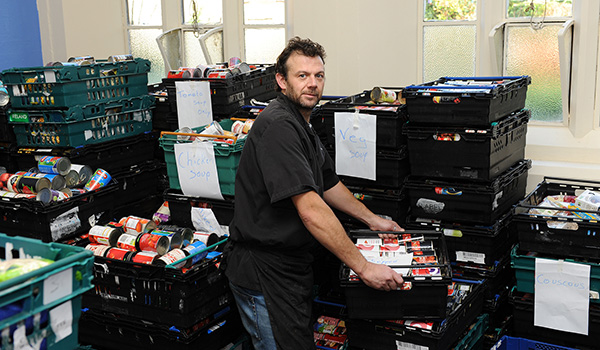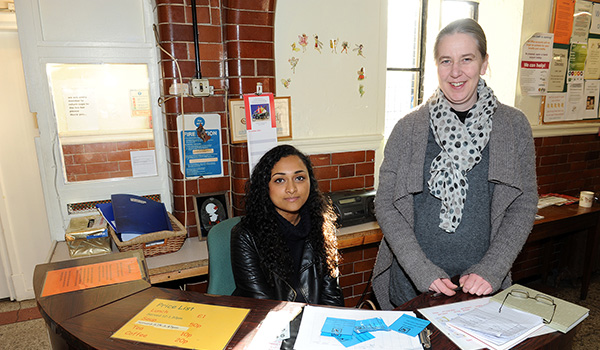As we continue to highlight the stories of those who often get forgotten during the festive season, Nemesha Balasundaram visits London’s Ace of Clubs – a day centre for the homeless
IT IS a daunting time of year for the most vulnerable in society.
Longer nights, the bitter cold and financial demands of the festive period are only a few of the concerns.
For those living on the streets during winter or who have accommodation but cannot afford to feed or clothe themselves, it is an isolating prospect.
It is 11am on a frosty December morning, and the team at the Ace of Clubs day centre for the homeless in Clapham Common are preparing for the 120 people, including many second-generation Irish men and women, that are expected to walk through its doors for lunch.
At one end of the dining room carrots and pears are being peeled, on the other a tea and coffee station is set up.
£1 meal vouchers are neatly arranged on the entrance counter ready to be sold, whilst chef, Dean Marriott, is finalising preparations for the lunch service.
The team is predominantly made up of former members of the centre, many of whom now find themselves on the other end of the food counter.
It is almost midday and the centre is about to become a hive of activity.
Many are eager to catch up with friends that they have made through the organisation; others are looking forward to the only chance that they will have to speak to someone all day.
The doors open and members begin queuing to purchase their meals. They have an hour and a half in which to do so.
A radio close to the entrance is blasting out commercial tracks; the walls are adorned with community-type posters, including one advertising a music and poetry class at 1pm every Tuesday.
The former primary school hall, set in the grounds of St Mary’s Catholic Church, has come alive.
Centre Director David Logan points out that, remarkably, several of the centre’s members who are now in their late 30s, had once been young students at the school as it originally stood.
 Chef Dean Marriott in the shelter's food storage room
Chef Dean Marriott in the shelter's food storage roomBrick walls that trace an era gone by run throughout the centre, but most eye-catching is the brightly coloured mural that serves as a cheerful backdrop to the lunchtime rush.
Some walk in with bulky rucksacks, others with little in hand.
A handful of people wait outside the main office to seek advice from Centre Manager, Sarah Miles, and Support Worker Nicola Lawton on matters such as hygiene, housing and health concerns.
As it is a Wednesday members are able to use the shower facilities for free. The service is available on Mondays and Fridays too, and slots are booked in to ensure their needs are met adequately.
A winter night shelter is also running for one evening each week, where 15 people are given overnight accommodation.
The transformation of the centre from when it first opened its doors in 1995 is significant.
The Ace of Clubs is more than a place to feed the hungry. It aims to build relationships with people, provide training and a safe shelter.
The centre’s aim is to provide welfare and educational support to reintegrate these individuals back into their local communities.
“We’re here to offer friendship and support to people in the community who have fallen on hard times,” explains David.
“We provide basic and urgent needs for the marginalised members of society, and aim to give them a head start.”
 Irish Post reporter Nemesha Balasundaram (left) with Centre Manager, Sarah Miles
Irish Post reporter Nemesha Balasundaram (left) with Centre Manager, Sarah MilesAnnually, the Ace of Clubs assists an average of 4000 local homeless and vulnerable people, with 102 people helped off the streets last year.
Many of the centre’s members are second-generation Irish men and women between the ages of 30-50 seeking help at the south London base.
Whilst there are individuals from a wide range of backgrounds and nationalities that attend, many with problems of addiction and mental health, a significant number have simply found themselves directly affected by the turbulent economy.
The numbers of Irish-born members were more noticeable in 2013, David adds, pointing out that many were young adults who were at the tail end of their couch-surfing journeys in the capital and in need of assistance.
There are rooms on the premises dedicated to allowing those who need it to rest or spend time reading in the safe and warm surroundings.
At the end of the corridor, a newly refurbished laundry room provides cleaning services and clothing.
Opposite, there is a storage room for food donated by local businesses, schools and churches that will supply the centre for roughly a seven-month period.
There are also new disabled facilities for its 10 members that require them.
On Christmas day this year, many of the shelter’s members who would otherwise be alone, will congregate together for a festive lunch.
David expects the number of people to replicate something similar to the 88 members that visited the centre on December 25 last year.
The figure is less than on a normal day as people seeking accommodation are often housed by this time, through organisations such as Crisis, he explains.
The help provided is on-going and whilst some individuals will successfully pave their way back into employment and get their lives back on track, many will continue to use the service for years to come.
The Ace of Clubs centre relies on fundraising, donations and the generosity of its local community and volunteers to keep its vital service alive for the many thousands of people it serves.
If you can help support the charity or offer your time as a volunteer visit www.aceofclubs.org.uk
CASE STUDY
John, mid-50s
Born in Suffolk, but raised in Balham, south London, John is a second-generation Irish man who seeks comfort at the Ace of Clubs.
He is dressed smartly, wearing a grey trilby, matching scarf, and black winter coat and has just drawn a conversation with a female member to a close.
A jovial character, full of life and gratitude for the services available to him, he is forthcoming in divulging the tribulations of his life that led him here.
The son of an Offaly construction man, and a mother from Wimbledon who worked as a cleaner, he grew up in a supportive family.
Aged 14, a guitar player with a passion for music, he attended a singing school in London. Throughout the years, he played at various pubs, living out his dreams of performing.
Everything seemed like it was heading in the right direction, but he fell foul to alcoholism. At his lowest point, he was drinking 16 cans of beer a day.
“I was drinking myself into oblivion,” he says. “My confidence was at an all-time low. I started drinking when I was a young teenager.”
It’s been 10 years since he first visited the centre. Meeting people and interacting with the staff are the main reasons he regularly attends.
Now, he is an assistant carer to his girlfriend of two years. Money is tight, but he explains that to him money is not the most important thing in the world.
“I get £30 a week in addition to the dole, but £22.50 of that goes towards travel,” he adds. “I don’t have much left for myself. As long as I have a roof over my head and I am healthy that’s what matters.”
*not his real name

